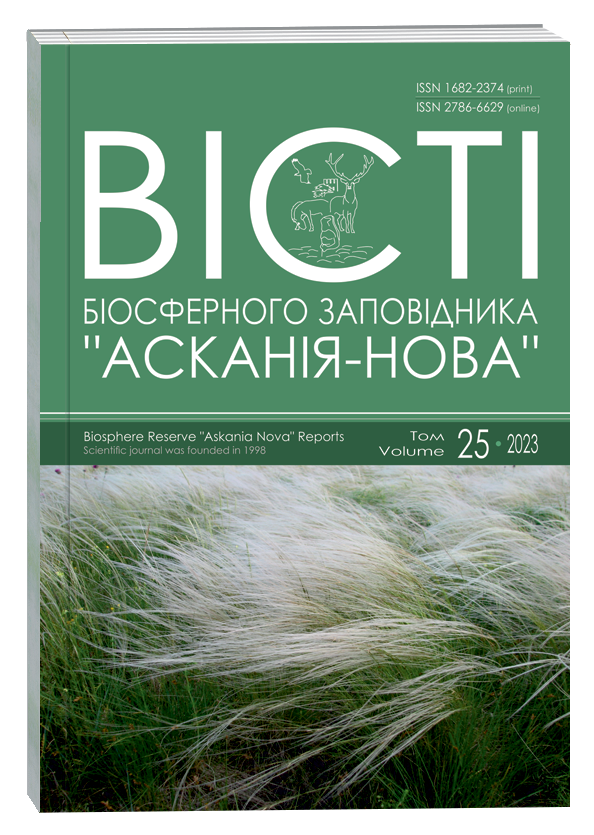MOLECULAR GENETIC ANALYSIS OF UKRAINIAN GRAY CATTLE BY THE BETA-CASEIN GENE
DOI:
https://doi.org/10.53904/1682-2374/2023-25/12Keywords:
Сіра українська порода, ПЛР-ПДРФ, поліморфізм, ген, А2-молоко, алель, генотипAbstract
The article describes the results of the study of the beta-casein gene in populations of the Gray Ukrainian breed of cows, which is associated with milk productivity. The most common variants of β-casein in dairy cattle are A1 and A2. The CSN2A1 variant causes serious abnormalities in the human body, namely a number of pathologi-cal disorders in the work of the intestines, coronary heart disease, diabetes, and autism in chil-dren. The analysis of scientific publications shows that the beta-casein gene (CSN2) has not been studied in aboriginal breeds of cattle of Ukraine, which are carriers of specific gene com-plexes and most rare alleles. We conducted molecular genetic studies of polymorphism at the beta-casein gene locus in populations of the aboriginal gray Ukrainian breed from the main breeders of this breed in Ukraine. Genomic DNA isolated from the whole blood of 173 animals was amplified using primers that were created on the basis of the sequences of the CSN2 gene of cattle. The amplified fragment of CSN2 with a length of 121 bp. treated with DdeI restriction enzyme. All three genotypes were detected in the studied populations: homozygous CSN2A1A1, CSN2A2A2 and heterozygous CSN2A1A2. The analysis of the results showed that carriers of the CSN2A1A2 heterozygous genotype predominate in the cows of the Markeevo State Farm (94.2%), the CSN2A2A2 genotype was absent. The results of genotyping of "Polyvanivka" SE revealed that 20% of animals are carriers of the CSN2A2A2 genotype, which produce A2 beta-casein milk. The CSN2A1A2 genotype prevailed, which was determined in 53% of cows. In general, the studied breed shows a fairly high level of the "desired" allele A2 – 0.468, when uncoupling, β-casoformin 7 is not produced.
References
Brody R. J., Kern S. E. Sodium boric acid: a Tris-free, cooler conductive medium for DNA electrophoresis. Biotechnique. 2004. № 36. P. 214–216. https://doi.org/10.2144/04362BM02
Clemens R. A. Milk A1 and A2 peptides and diabetes. Milk and Milk Products in Human Nutrition. Karger Publishers. 2011. P. 187–195. https://doi.org/10.1159/000325584
De S., Paradkar P. & Vaidya A. Indian Breed Cow Milk-Powerhouse of Health. J. Pharm. Res. 2015. № 1. Р. 573–591.
Eigel W., Butler J., Ernstrom C., Farrell H. Jr., Harwalkar V., Jenness R., Whitney R. M. Nomenclature of proteins of cowʹs milk: Fifth revision. Journal of Dairy Science. 1984. № 67(8). Р. 1599–1631. https://doi.org/10.3168/jds.S0022-0302(84)81485-X
Elliott R. B., Reddy S. N., Bibby N. J. and Kida K. Dietary prevention of diabetes in the non-obese diabetic mouse. Diabetologia. 1988. № 31. Р. 62–64. https://doi.org/10.1007/BF00279136
Farrell Jr. H., Jimenez-Flores R., Bleck G., Brown E., Butler J., Creamer L., Hicks C., Hollar C., Ng-Kwai-Hang K. H. Nomenclature of the proteins of cowsʹ milk-Sixth revision. Swaisgood. Journal of Dairy Science. 2004. № 87(6). Р. 1641–1674. https://doi.org/10.3168/jds.S0022-0302(04)73319-6
Haq M. R., Kapila R., Shandilya U. K. and Kapila S. Impact of milk derived β-casomorphins on physiological functions and trends in research: A Review. Internat. J. Food Prop. 2014. № 17(8). Р. 1726–1741. https://doi.org/10.1080/10942912.2012.712077
Ho S., Woodford K., Kukuljan S. & Pal S. Comparative effects of A1 versus A2 beta-casein on gastrointestinal measures: a blinded randomised cross-over pilot study. European Journal of Clinical Nutrition. 2014. № 68(9). Р. 994–1000. https://doi.org/10.1038/ejcn.2014.127
Jaiswal K. P., De S. & Sarsavan A. Review on bovine beta-casein (A1, A2) gene polymorphism and their potentially hazardous on human health. International Journal of Environment & Animal Conservation. 2014. № 3(1). Р. 1–12.
Kaminski S., Cieslinska A., Kostyr E. Polymorphism of bovine beta-casein and its potential effect on human health. J. Appl. Genet. 2007. № 48(3). Р. 189–198. https://doi.org/10.1007/BF03195213
Lien S., Kantanen J., Olsaker I. Comparison of milk protein allele frequencies in Nordic cattle breeds. Anim. Genet. 1999. № 30. Р. 85–91. https://doi.org/10.1046/j.1365-2052.1999.00434.x
McLachlan, C. N. Breeding and milking cows for milk free of β-casein A1. United States Patent 7094949. 2006.
Mishra B., Mukesh M., Prakash B., Sodhi M., Kapila R., Kishore A., Kataria R., Joshi B., Bhasin V. & Rasool T. Status of milk protein, β-casein variants among Indian milch animals. Indian J. Anim. Sci. 2009. № 79. Р. 722–725.
Ng-Kwai-Hang K. & Grosclaude F. Genetic polymorphism of milk proteins. Advanced Dairy Chemistry. 1992. № 1. P. 405–455.
Panicke L., Freyer G., Erhardt G. Effects of milk protein genotypes on milk production traits: 48th Annual Meeting of the European. Association for Animal Produktion am 25–8.08.1997 in Vienna. Austria : Wageningen Academic Publishers, 1997. 3rd ed. Р. 514.
Roginski H., Fuquay J. W., Patrick F. F. Encyclopedia of dairy sciences. London : Academic Press, 2003. 2500 p.
Şahin Ö., Boztepe S., Aytekin İ. A1 and A2 Bovine Milk, the Risk of Beta-casomorphin-7 and Its Possible Effects on Human Health: (II) Possible Effects of Beta-casomorphin-7 on Human Health. Selcuk Journal of Agriculture and Food Sciences. 2018. № 32(3). Р. 632–639.
Suprovych T. M., Mokhnachova N. B. Gene polymorphism of economically-useful traits in Ukrainian gray cattle breed. Animal Biology. 2017. № 19(1). Р. 111–119.
Szwajkowska M., Wolanciuk A., Barlowska J., Krol J., Litwinczuk Z. Bovine milk proteins as the source of bioactive peptides influencing the consumersʹ immune system. Anim. Sci. Pap. Rep. 2011. № 29. Р. 269–280.







